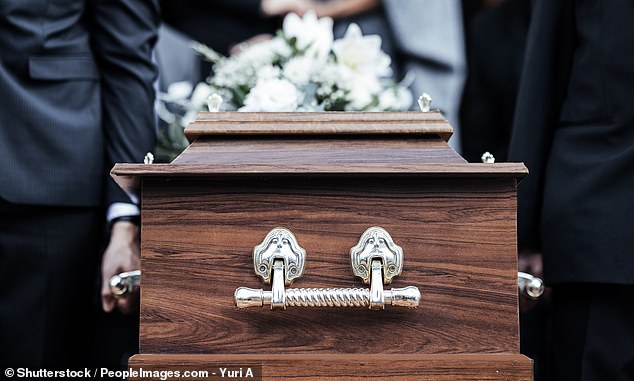A new breed of ‘sick’ scammer is trawling through obituary notices in newspapers and on social media posts to sell fake access to funerals streamed over the internet.
These heartless criminals have easy access to publicly available death notices. They then create fake Facebook profiles, posing as family or friends of the recently deceased.
After doing this, they contact potential mourners to offer them links to a fake ‘live stream’ of a funeral for about £10. But after paying, victims cannot log on.
The fraudsters also often ask you to support a phoney donation page being set up on behalf of the dead person’s family using a trusted fundraising platform such as JustGiving. Any donations are pocketed by criminals.
Halde Pottinger, a humanist celebrant who conducts non-religious funeral ceremonies on behalf of half a dozen families a week, says that many of his services are now being targeted by these criminals.
Sadly, Halde, from Inverness, has had first-hand experience of this crime, when his older brother Ranald, 42, died a year ago.

Targeted: Halde Pottinger received five phoney invitations to watch his brother’s funeral online – despite attending it in person and it not being streamed over the internet
He received five phoney invitations to watch his brother’s funeral online – despite attending his brother’s send-off in person and the ceremony not being streamed over the internet.
Halde, 41, says: ‘They waited until an hour before my brother’s funeral – a time when people are at their most vulnerable.
‘I went to turn my phone off and saw five Facebook messages from different accounts offering access to a live-stream of his funeral. The pages included photos and details of my brother. It was shocking.’
After the service, he discovered that other family members had also been targeted, including a niece who was ‘befriended’ by a scammer.
Online funerals became common during the pandemic when ceremonies were often streamed over the internet because social distancing rules meant it wasn’t possible for all family and friends to attend in person.
The Chartered Trading Standards Institute (CTSI) says that over the past couple of years, there has been a growth in what it calls a ‘disturbing scam’.
Katherine Hart, from the CTSI, says: ‘Targeting people during one of the most emotionally difficult moments of their lives is despicable. It is particularly upsetting as victims often feel they cannot report what is happening for fear of adding further stress to grieving families. The criminals count on their silence.’
Trade body the National Association of Funeral Directors (NAFD) believes that many victims do not report the crime, while some may not realise it was a scam at all. So it is hard to gauge numbers affected. However, it says live streaming and fundraising scams are on the rise.
Halde fears that vulnerable people may be more likely to fall victim as they might struggle to get to a funeral in person and be less aware of internet scams.
He says: ‘It is sick and disgusting. The more tragic a death – such as if someone dies young, a suicide or the death occurred in particularly unexpected circumstances – then the more it seems to attract scammers.
‘Fewer people will come forward to admit they have been swindled when the death was particularly tragic.’

Dead links: Scammers are creating fake Facebook profiles, posing as family or friends of the recently deceased, to offer fake streaming of funeral ceremonies
The CTSI says there are no circumstances when you should be charged to attend a funeral – either in person or for a live stream.
It is concerned at how criminals are able to set up fake Facebook pages in the name of recently deceased people to lure in subscribers, and contact victims directly through social media messaging. It wants more robust vetting measures to be put in place by the social media firms.
It is also alarmed that people are being asked to donate money through fundraising websites such as JustGiving, with criminals seemingly finding it easy to set up fake accounts on behalf of the deceased’s family or even funeral directors.
The CTSI says: ‘Never share personal or banking information in response to unsolicited messages. Be cautious of friend requests or messages from unfamiliar profiles, even if they appear to be mutual friends.’
Stealing images of people from the internet and setting up a fake website in their memory requires only basic computer skills.
Halde also fears that many criminals may not have finished with you after taking a donation but will mark you out as being a person who might be susceptible to being scammed again.
He says: ‘After the initial fraud, these criminals might well contact you again. If they can get hold of your bank details and other personal information, such as your full name, date of birth and address, you could become a victim of identity theft.’
Criminals can sell your personal information on the dark web, with IDs typically being sold from about £10. If bank details are
stolen, it may be possible for them to go on a spending spree – even taking out credit cards and loans in your name, as they empty your bank account.

Donations: Authorities are concerned that criminals are setting up fake fundraising accounts on websites such as JustGiving
Andrew Judd, chief executive of the NAFD, says: ‘Scamming people who are grieving for the loss of a loved one is reprehensible, but the reality is that we have heard about more of these cases from our members recently.
‘Instead of clicking on anything that claims to be asking for donations, please just check with the family or the funeral director to see whether it is legitimate. If a funeral really is being live streamed, a trusted funeral director will be able to provide a genuine link and talk about concerns.’
A spokesperson for Meta, which owns Facebook, says: ‘We are continually investing in protections against fraud for those using our platforms and work closely with law enforcement to support investigations.
‘We encourage our community to report activity such as this to us and the police, so that we can take action.’
A JustGiving spokesperson says: ‘As a regulated payments company, we take the safety and security of our users extremely seriously.
‘We have monitoring systems and fraud detection measures in place to identify and mitigate suspicious activity. These controls are regularly reviewed and updated in line with industry best practices and regulatory requirements.
‘Our terms of service strictly prohibit fraudulent activity. We work closely with law enforcement and other relevant authorities to investigate and take action against any misuse of our platform. We provide clear guidance to donors and campaign organisers on staying safe online.’













